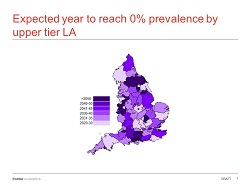Much work to be done

England will not go smoke free until after 2050, according to new research conducted by Frontier Economics and commissioned by Philip Morris Limited (PML).
However, there are stark variations in the predicted rates of decline in different parts of the country, with one in 10 areas predicted still to be smoking in 32 years’ time and 23 percent predicted to have stopped before 2030.
The areas predicted to go smoke free soonest are Bristol (in 2024), Wokingham and York (both 2026).
The areas expected still to be smoking beyond 2050 include North Lincolnshire, Derby and Cheshire East.
The research highlights also a variety of measures that could accelerate the decline in cigarette smoking, including increasing the number of smokers using National Health Service Stop Smoking services and getting more switching to better alternatives such as electronic cigarettes and non-combusted cigarettes.
The new figures are detailed on a website launched by PML at www.lastsmoke.co.uk, which presents Office of National Statistics data for postcode areas through an interactive tool. It also includes a powerful call to action to encourage communities to go smoke free faster.
The findings of the report include:
- Regional falls in smoking rates from 2011 to 2017 varied from 10 percent to one percent, with one area, Cheshire East, seeing a rise in smoking prevalence in 2017 from that of six years earlier.
- Significant differences in smoking prevalence across England, with three percent of local authority areas having a rate higher than 20 percent and four percent having a rate of between five percent and 10 percent.
- Deprived areas have a higher prevalence rate of smokers. The three areas with the highest rates of smoking, Kingston upon Hull, Blackpool and North Lincolnshire, have an average rate of 22.1 percent, compared to an average rate of 8.8 percent among the three lowest, which are Rutland, York and Wokingham.
The Last Smoke website also includes other proposals that could accelerate the end of cigarettes in the country. These include more independent research into smoking alternatives, targeted government campaigns through school and social media to stop smoking in the first place and tackling the trade in illicit cigarettes by taking tougher action against criminal gangs.
“Our business is committed to going smoke free as fast as possible and ultimately stopping selling cigarettes altogether,” said Mark MacGregor, UK corporate affairs director of PML. “What this research reveals is the huge variations in the decline in smoking in different parts of the country. We want to play our part in working with local businesses, retailers and councils in the areas with highest smoking rates. It is not going to be easy getting smokers in these areas to stop. One of the keys to success will be ensuring they understand that there are more alternative options than ever that can help them give up cigarettes for good.”